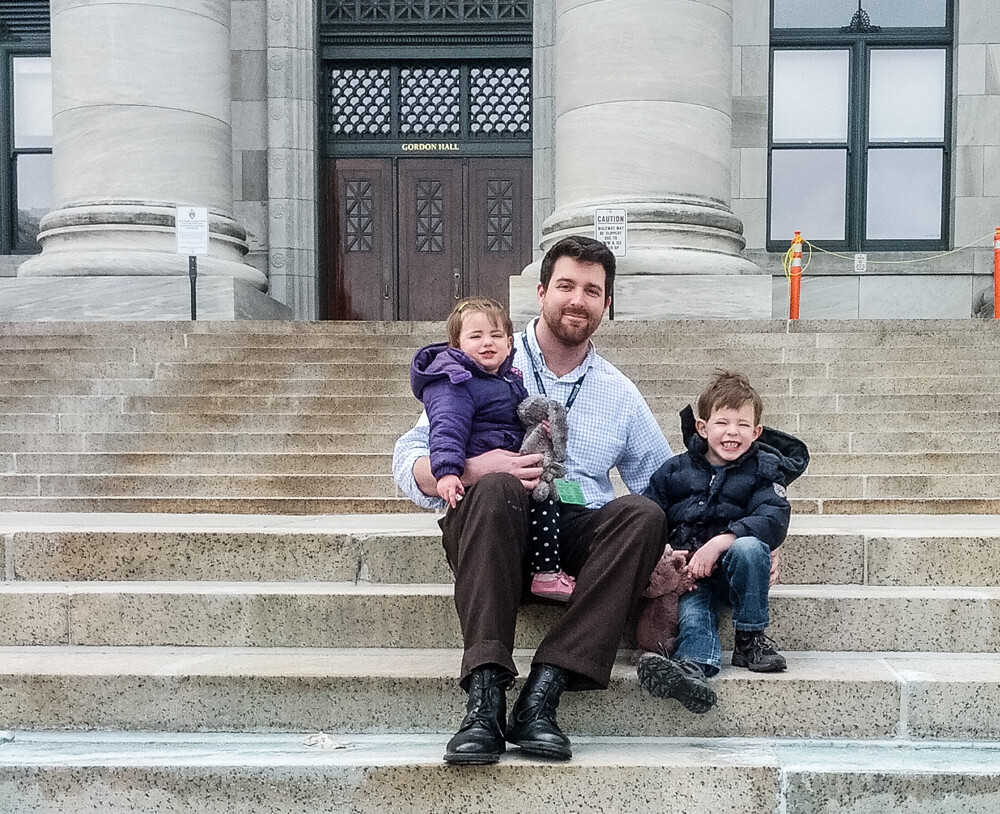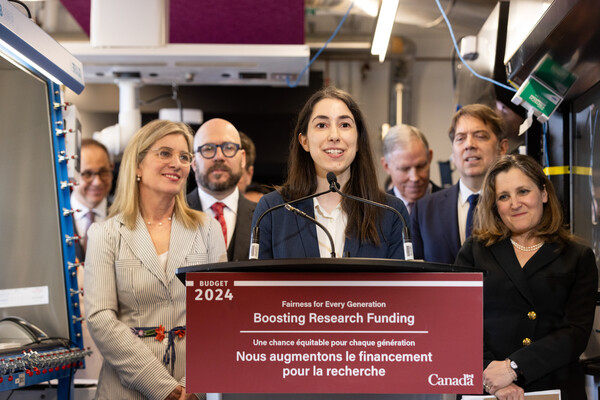Main Second Level Navigation
Breadcrumbs
- Home
- News & Events
- Recent News
- From Fellow to Faculty: Q&A with Alumnus Adrian Dubuc
From Fellow to Faculty: Q&A with Alumnus Adrian Dubuc

Jim Oldfield
 By the time he turned 30 last fall, Adrian Dubuc was a cytogeneticist at Brigham and Women's Hospital and an instructor in pathology at Harvard Medical School. His journey to Boston from Ottawa, where he studied biochemistry as an undergraduate, was not a straight line. But at each crossroads, Dubuc says friends and mentors helped him choose the best direction and set clear goals for the future.
By the time he turned 30 last fall, Adrian Dubuc was a cytogeneticist at Brigham and Women's Hospital and an instructor in pathology at Harvard Medical School. His journey to Boston from Ottawa, where he studied biochemistry as an undergraduate, was not a straight line. But at each crossroads, Dubuc says friends and mentors helped him choose the best direction and set clear goals for the future.
Dubuc made a crucial career decision while a graduate student in the Department of Laboratory Medicine and Pathobiology (LMP) at the University of Toronto. He was based in the lab of SickKids scientist Professor Michael Taylor, where he co-authored several high-impact papers which described molecular heterogeneity (how cancers that appear similar have different genetic profiles) in childhood brain cancers. But midway through his PhD, Dubuc discovered clinical cytogenetics as a career option, and toward the end of his doctorate he began planning to enter the field.
After he graduated from U of T, Dubuc did a two-year clinical cytogenetics fellowship at Harvard that led to his faculty appointment and the hospital staff position. Dubuc recently spoke with writer Jim Oldfield about his shift toward clinical cytogenetics, his time in LMP and life in Boston.
Can you describe your role as a cytogeneticist at Brigham and Women's?
Sure. I run a hospital-based genetics laboratory where we analyze our patients' chromosomes, evaluating numerical and structural changes. I issue reports on our findings and talk to clinicians about the results. I don't interact directly with patients but I see about 30 cases a day — that's 30 patients whose care is influenced and managed by the work I do.
What type of information can you give clinicians?
Clinicians go through genetics training, but to vastly varying degrees. As a cytogeneticist, I provide our clinical team with detailed information on genetic findings that we identify through specific testing. These results can have major implications for our understanding of normal development or disease. By example, the genetic status of HER2 amplification or ALK rearrangement in breast and non-small cell lung cancer, respectively, have profound impacts on treatments of those cancers types. These are only two of many examples of how cytogenetics has a large and growing impact on clinical care.
When did you develop an interest in the clinical side of cytogenetics?
I developed an interest in clinical cytogenetics part way through my PhD. As part of my doctorate I was analyzing genomic data from large cohorts of patients with brain tumours. While our group's work led to a redefined understanding of genomics in brain cancers, I didn’t have a clear view of how or when this information would get incorporated into clinical practice. Serendipitously, a friend of mine, Adam Smith, was enrolled in the clinical cytogenetics training program at SickKids and U of T, and he told me about his experiences in clinic. I was amazed to hear of the opportunities in this role, and subsequently I spent a lot of time in the cytogenetics laboratory at SickKids talking to Mary Shago and her team about their role and responsibilities in the hospital. As a result of these talks, I re-directed my career toward clinical cytogenetics, hoping to use my background in genomics to help define and establish new clinical practices. As a PhD student, it's easy to get caught up the in the day-to-day, doing your next assay or processing your next slide. Then years go by and you haven't thought about the long-term. I'm glad I did that planning well before the end of my doctorate, and it helped to know my job options.
What was the most important thing you learned in the Taylor lab?
Probably the biggest thing I learned was the power of collaboration, locally and internationally. We had a great group very talented individuals in the lab — like Paul Northcott, Stephen Mack and John Peacock — who embraced the ‘work hard, play hard’ mentality. We worked competitively and collaboratively, and ultimately published in the best journals in the field. Michael fostered an incredible environment to learn and thrive, and he put together an international effort that helped advance our understanding of pediatric brain tumors. I’ll forever be grateful for the opportunity to participate in these efforts.
How else did your time as a doctoral student prepare you for your current role?
Michael encouraged us to take on new learning opportunities, lead projects and present our work at national and international conferences. There were always more opportunities than hours in a day, and I constantly felt I was learning. I learned a lot about bioinformatics, which drives so much research today, and I had to learn how to multi-task on various projects. Leading projects, speaking confidently in public and multi-tasking are critical to many jobs, and certainly my experiences in Toronto have helped me tremendously in my current role.
How is life for you different in Boston?
Well, there are perpetual adjustments to hit the right work-life balance, spending time with my wife Kaely and our kids, Max (who is three and a half) and Charlize (who is 20 months). It’s been a busy but fun time for us as a family! In regards to the career, it's really life in the fast lane now. I’m still adapting to the transition from fellow to faculty, taking on additional responsibilities within our laboratory. And because of the health care model here in the United States there’s a little more flexibility (and less governmental oversight) in the types of tests we offer in the context of clinical care. So for example, tests can include next generation sequencing panels and actionable therapeutic targets in cancer, and non-invasive prenatal testing from a maternal blood draw to screen for fetal anomalies. Genomics is really an explosive field, which is rapidly evolving every day. I feel very fortunate to have found a career that I love — and that doesn’t allow me to get bored! Boston is a great place to learn about and stay on top of the changes in our understanding of genomics. But Canada will always be home, and the long-term plan has always been to come home. I guess the question is, “How long is long-term?”
News


